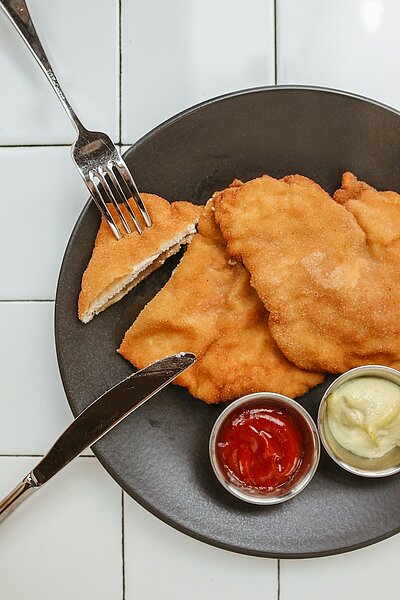Schnitzel

Schnitzel is a popular dish in many countries, but is it also suitable for dogs? In this article, you will find out what schnitzel is, how it is prepared and what advantages and disadvantages it has for your four-legged friend.
What is schnitzel?
Schnitzel is a thin piece of meat, usually pork, veal or chicken, which is breaded with flour, egg and breadcrumbs and fried in fat. There are many variations of schnitzel, depending on the region and taste. In Austria, for example, Wiener Schnitzel is often served, which is made from veal and garnished with lemon. In Germany, there is Jägerschnitzel, which is coated with a mushroom sauce, or Zigeunerschnitzel, which is served with a paprika and tomato sauce.
How is schnitzel for dogs prepared?
If you want to give your dog schnitzel, there are a few things you should bear in mind. Firstly, you should only use high-quality meat that is fresh and boneless. Secondly, you should avoid breading, as this contains too much fat, salt and carbohydrates, which are unhealthy for dogs. In addition, you should not fry the meat in fat, but rather bake it in the oven or fry it in a pan with a little oil. This will prevent your dog from consuming too many calories and becoming overweight or having digestive problems. Finally, you should not add any sauces or spices, as these can be harmful to dogs. For example, onion can cause anemia, garlic can cause stomach irritation and lemon can cause heartburn.
What are the benefits of schnitzel for dogs?
Schnitzel can be a good source of protein for dogs, which is important for muscle building and cell regeneration. Meat also contains iron, zinc and B vitamins, which are important for blood formation, the immune system and metabolism. So if you give your dog a piece of schnitzel every now and then, you can add some variety to his diet and provide him with important nutrients.
What are the disadvantages of schnitzel for dogs?
Schnitzel also has some disadvantages for dogs. On the one hand, it can lead to allergic reactions if your dog is sensitive to certain types of meat. On the other hand, it can lead to nausea, vomiting or diarrhea if your dog eats too much schnitzel or too quickly. It can also lead to dental problems if your dog doesn't chew the meat properly or if leftovers get stuck between their teeth. Finally, it can lead to long-term health problems if your dog gets too much schnitzel or too often. For example, it can lead to obesity, diabetes or cardiovascular disease.
Schnitzel is a delicious dish for humans, but not necessarily for dogs. If you want to give your dog schnitzel, you should only do so rarely and in small quantities and make sure that it is prepared without breading and without sauces or spices. This way you can give your dog a treat without endangering his health.
If you notice any signs of hypersensitivity or poisoning in your dog, you should see your vet immediately. We are not a substitute for a vet, but we try to be as accurate as possible. Every dog reacts differently and we recommend you get a second opinion or consult your vet if in doubt.
Stay healthy and take good care of your four-legged friend!😊